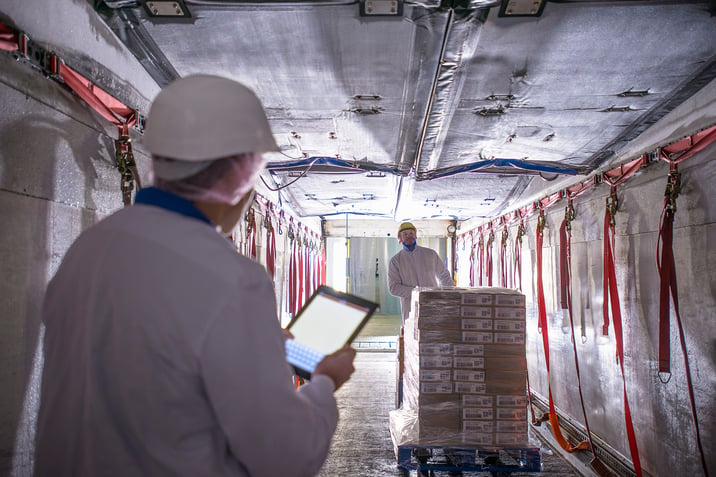Tips to avoid spoilage or rejected loads

Spoilage and rejected loads are potential risks when hauling refrigerated loads. Various factors can lead to a cargo loss if you are not careful. To help reduce the risk of a loss, read the information below and ask yourself if there are actions you can take to prevent a refrigerated load from spoiling or being rejected.
 PRE-LOADING CHECKS
PRE-LOADING CHECKS
- Is the refrigeration unit operating properly?
- Are the fuel, oil, and coolant levels of the refrigeration unit sufficient?
- Is the thermostat calibrated?
- Are the refrigeration air chutes and ducts properly installed and in good repair?
- Do the trailer doors seal tightly when closed?
- Are the trailer walls free of cracks and holes?
- Is the front bulkhead installed?
- Do floor drains open?
- Is the inside of the trailer clean and odor free?
- Are floor grooves free of debris?
- Are the trailer’s interior height, width, and length adequate for load?
- Is the load properly secured?
- Has the trailer been adequately pre-cooled (or pre-warmed)?
- Does the trailer have proper ventilation?
 DAILY TASKS
DAILY TASKS
- Inspect the vehicle thoroughly before each trip.
- Follow the manufacturer’s recommended maintenance procedures.
- Check the load’s required temperature on the bill of lading.
- Use a pulp thermometer to test the temperature of the product before loading to make certain it matches the required transit temperature.
- Do not accept a load unless the product’s temperature matches the required transit temperature.
- Document any discrepancies on the shipping papers and report the issue before accepting the load.
- Upon delivery, verify and document the temperature of the load on the bill of lading again.
- To avoid temperature fluctuations during loading/unloading, keep the refrigeration unit turned off.
- Ensure the product does not obstruct airflow inside the trailer.
- During stops, monitor the refrigeration unit to ensure it maintains the desired temperature.
- Do not leave temperature-sensitive cargo unattended while parked.
- Utilize a temperature recording device, if available.
- In the event of a vehicle accident while transporting refrigerated products, report the incident immediately to help prevent cargo damage.
Note: These lists are not intended to be all-inclusive.
The information in this article is provided as a courtesy of Great West Casualty Company and is part of the Value-Driven® Company program. Value-Driven Company was created to help educate and inform insureds so they can make better decisions, build a culture that values safety, and manage risk more effectively. To see what additional resources Great West Casualty Company can provide for its insureds, please contact your safety representative, or click below to find an agent.
© Great West Casualty Company 2022. The material in this publication is the property of Great West Casualty Company unless otherwise noted and may not be reproduced without its written consent by any person other than a current insured of Great West Casualty Company for business purposes. Insured should attribute use as follows: “© Great West Casualty Company 2022. Used with permission by Great West Casualty Company.”
This material is intended to be a broad overview of the subject matter and is provided for informational purposes only. Great West Casualty Company does not provide legal advice to its insureds, nor does it advise insureds on employment-related issues. Therefore, the subject matter is not intended to serve as legal or employment advice for any issue(s) that may arise in the operations of its insureds. Legal advice should always be sought from the insured’s legal counsel. Great West Casualty Company shall have neither liability nor responsibility to any person or entity with respect to any loss, action, or inaction alleged to be caused directly or indirectly as a result of the information contained herein.




